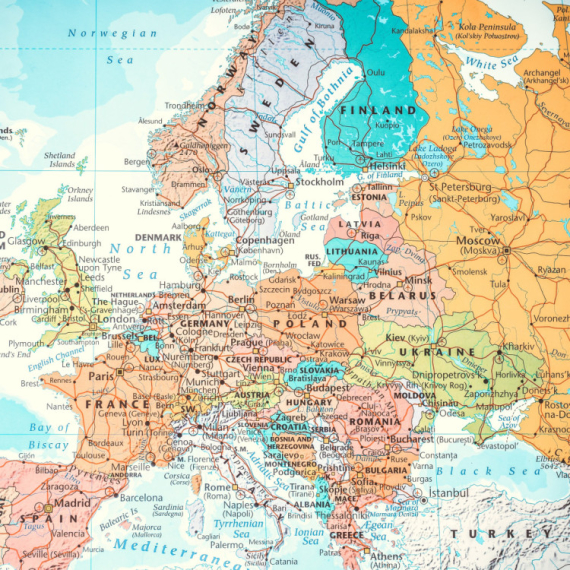Four keys to China's peaceful rise
Saturday, 20.12.2008.
12:23

Four keys to China's peaceful rise Some reactions I've had to columns I recently wrote from China indicate a large potential for misunderstanding, especially among Chinese readers, so let me make the argument plain. Start at a possible bad end. When great powers rise and fall, there's an increased danger of war - not today or tomorrow, but in a timescale of decades. That proposition does not imply any judgment on Chinese culture or national character. It merely reflects a recurrent pattern of history, seen across thousands of years in many different regions and cultures. The war may not be started by the ascendant power. It may be started by the declining power, with defensive aggression. It may even be against someone else. (The hegemonic transfer from Britain to the US came as both were fighting Nazi Germany.) There is nothing remotely original or offensive in this line of thought. The very notion of "peaceful rise", launched by a leading Communist party thinker a few years ago, was predicated on the same insight: that, historically, nations' rises have often not been peaceful. (The preferred official term may now be "peaceful development", but "peaceful rise" is analytically much sharper.) So that's the long-term risk: war. But the long-term opportunity is equally large: imagine one-fifth of humankind organised in a single modern, prosperous state, playing a constructive part in a co-operative international system and tackling trans- national challenges, such as global warming, which threaten us all. So the stakes are huge, either way. Now let's be clear on one thing. What China does, whether it goes on rising and if so, how, is mainly up to the Chinese: legally, since theirs is a sovereign state; morally, since peoples have a right to shape their own destinies; but also practically, since the capacity of anyone else to influence the evolution of such a large, self-referential country is limited. Limited, but far from nil. This is not the 17th century. The prospects for the Chinese economy in 2009 depend directly on what happens in the American and European markets for Chinese exports. So we who are not Chinese have not just a stake, but also a hand in this story. I have therefore come up with this shortlist of four keys to China's peaceful rise, attaching to each point a rough guesstimate of the division of responsibility (DoR) between us. In the confines of a column, my list is necessarily selective and of telegraphic brevity. I offer it with the health warning that on this subject I depend heavily on the expertise of others, and on Chinese voices interpreted or self-translated into English. Since, however, those experts and Chinese voices profoundly disagree among themselves, we outsiders still have to make up our own minds. Anyway, to stir debate, here are my four keys to China's peaceful rise. I welcome all responses, however critical, from those who are experts on China or, better still, are Chinese themselves. Beijing this holiday season (Beta) 1. Domestic Evolution (DoR: China, 90%; Rest of World, 10%) Surely the biggest single key. What's so interesting about talking to Chinese scholars, journalists and officials is their shared sense that the Chinese system is on a long, exciting journey to an unknown destination. After 30 years of incremental economic reform, they look forward to 30 years of incremental political reform. The rule of law, improved governance and elements of democracy (though not full-dress western-style liberal democracy) are all mentioned as part of the mix. The diversity of provinces and cities - as well as Hong Kong and, indirectly, even Taiwan - gives the chance for experimentation. Unlike in the United States or Britain, the expectation is that in 30 years' time the political system will be qualitatively different from what it is today. Nobody knows what it will be. I suggest that those of us in the rest of the world who believe in the virtues of liberal democracy should respond roughly thus: "We wish you all good fortune on this journey. If you feel you can take something useful from our experience - the technology transfer of governance, so to speak - we will be delighted. We think you will find in the end that liberal democracy is the best way to run a country, but we welcome this ideological competition. If you can come up with a different system that durably satisfies the aspirations of your people, we shall greet it with fascination and respect. If not, we too will suffer the negative consequences." 2. The US-China Special Relationship (DoR: US, 65%; China, 35%) In recent months, I argued in both China and the United States that the EU-China relationship should be strengthened to match the US-China one. In both countries I came away with a flea in my ear. Both sides clearly believe their relationship is unique. Very well then: over to you guys. The larger responsibility must lie with the currently more powerful state. The Obama administration should make an offer of strategic partnership to Beijing, starting with issues such as climate change and nuclear proliferation. For its part, China needs to step beyond its current paradigm, which is (I parody slightly): "What matters to us in the world is what's good for our domestic development, and what's good for our domestic development will be good for the world." 3. From G8 to G14 (DoR: the west, 70%; China, 30%) Tempting though it may be to some Chinese - "How about G2?" one scholar teased me in Shanghai - it's obvious that Sino-American dyarchy can't work on its own. The decision to go from G8 to G14 (or thereabouts) should be made already by the G8 summit in Italy in 2009. But "G8 to G14" is also shorthand for other ways in which China has to be given a larger role in the structures of global governance, including global financial institutions. There's a trade-off here. Parodying slightly again, one could say that the west wants China to take more responsibility without giving it more power, while China wants more power without taking more responsibility. We'll have to meet somewhere in the middle. 4. Deep cultural and social engagement (DoR: 50-50) The peaceful power shift from Britain to the United States was facilitated by the fact that they were culturally about as close as it is possible for two different countries to be. Brits and Americans speak the same language, more or less. America and China - the west altogether and China - are culturally very different. They don't speak the same language. Mutual understanding requires a correspondingly greater effort. China is using some of its foreign currency reserves to send its students to American and British universities; we should be using our resources to welcome them here, and send more of our own students there with the necessary language training. Our newspapers should report China in as much detail as we do the United States. We should encourage people-to-people exchanges on a massive scale, and use the potential of the internet. For a meeting of minds, the best thing of all is still a personal meeting - but these days, we don't need to meet to get talking. This article originally appeared on Guardian.co.uk As we mark the 30th anniversary of Deng Xiaoping's launching the country's world-changing economic reforms, I want to address the $65 quadrillion question of China's peaceful rise. Timothy Garton Ash "The larger responsibility must lie with the currently more powerful state. The Obama administration should make an offer of strategic partnership to Beijing, starting with issues such as climate change and nuclear proliferation."
Four keys to China's peaceful rise
Some reactions I've had to columns I recently wrote from China indicate a large potential for misunderstanding, especially among Chinese readers, so let me make the argument plain.Start at a possible bad end. When great powers rise and fall, there's an increased danger of war - not today or tomorrow, but in a timescale of decades. That proposition does not imply any judgment on Chinese culture or national character. It merely reflects a recurrent pattern of history, seen across thousands of years in many different regions and cultures. The war may not be started by the ascendant power. It may be started by the declining power, with defensive aggression. It may even be against someone else. (The hegemonic transfer from Britain to the US came as both were fighting Nazi Germany.)
There is nothing remotely original or offensive in this line of thought. The very notion of "peaceful rise", launched by a leading Communist party thinker a few years ago, was predicated on the same insight: that, historically, nations' rises have often not been peaceful. (The preferred official term may now be "peaceful development", but "peaceful rise" is analytically much sharper.) So that's the long-term risk: war. But the long-term opportunity is equally large: imagine one-fifth of humankind organised in a single modern, prosperous state, playing a constructive part in a co-operative international system and tackling trans- national challenges, such as global warming, which threaten us all. So the stakes are huge, either way.
Now let's be clear on one thing. What China does, whether it goes on rising and if so, how, is mainly up to the Chinese: legally, since theirs is a sovereign state; morally, since peoples have a right to shape their own destinies; but also practically, since the capacity of anyone else to influence the evolution of such a large, self-referential country is limited. Limited, but far from nil. This is not the 17th century. The prospects for the Chinese economy in 2009 depend directly on what happens in the American and European markets for Chinese exports. So we who are not Chinese have not just a stake, but also a hand in this story.
I have therefore come up with this shortlist of four keys to China's peaceful rise, attaching to each point a rough guesstimate of the division of responsibility (DoR) between us. In the confines of a column, my list is necessarily selective and of telegraphic brevity. I offer it with the health warning that on this subject I depend heavily on the expertise of others, and on Chinese voices interpreted or self-translated into English. Since, however, those experts and Chinese voices profoundly disagree among themselves, we outsiders still have to make up our own minds. Anyway, to stir debate, here are my four keys to China's peaceful rise. I welcome all responses, however critical, from those who are experts on China or, better still, are Chinese themselves.
1. Domestic Evolution
(DoR: China, 90%; Rest of World, 10%) Surely the biggest single key. What's so interesting about talking to Chinese scholars, journalists and officials is their shared sense that the Chinese system is on a long, exciting journey to an unknown destination. After 30 years of incremental economic reform, they look forward to 30 years of incremental political reform. The rule of law, improved governance and elements of democracy (though not full-dress western-style liberal democracy) are all mentioned as part of the mix. The diversity of provinces and cities - as well as Hong Kong and, indirectly, even Taiwan - gives the chance for experimentation. Unlike in the United States or Britain, the expectation is that in 30 years' time the political system will be qualitatively different from what it is today. Nobody knows what it will be.I suggest that those of us in the rest of the world who believe in the virtues of liberal democracy should respond roughly thus: "We wish you all good fortune on this journey. If you feel you can take something useful from our experience - the technology transfer of governance, so to speak - we will be delighted. We think you will find in the end that liberal democracy is the best way to run a country, but we welcome this ideological competition. If you can come up with a different system that durably satisfies the aspirations of your people, we shall greet it with fascination and respect. If not, we too will suffer the negative consequences."
2. The US-China Special Relationship
(DoR: US, 65%; China, 35%) In recent months, I argued in both China and the United States that the EU-China relationship should be strengthened to match the US-China one. In both countries I came away with a flea in my ear. Both sides clearly believe their relationship is unique. Very well then: over to you guys.The larger responsibility must lie with the currently more powerful state. The Obama administration should make an offer of strategic partnership to Beijing, starting with issues such as climate change and nuclear proliferation. For its part, China needs to step beyond its current paradigm, which is (I parody slightly): "What matters to us in the world is what's good for our domestic development, and what's good for our domestic development will be good for the world."
3. From G8 to G14
(DoR: the west, 70%; China, 30%) Tempting though it may be to some Chinese - "How about G2?" one scholar teased me in Shanghai - it's obvious that Sino-American dyarchy can't work on its own. The decision to go from G8 to G14 (or thereabouts) should be made already by the G8 summit in Italy in 2009. But "G8 to G14" is also shorthand for other ways in which China has to be given a larger role in the structures of global governance, including global financial institutions.There's a trade-off here. Parodying slightly again, one could say that the west wants China to take more responsibility without giving it more power, while China wants more power without taking more responsibility. We'll have to meet somewhere in the middle.
4. Deep cultural and social engagement
(DoR: 50-50) The peaceful power shift from Britain to the United States was facilitated by the fact that they were culturally about as close as it is possible for two different countries to be. Brits and Americans speak the same language, more or less. America and China - the west altogether and China - are culturally very different. They don't speak the same language.Mutual understanding requires a correspondingly greater effort. China is using some of its foreign currency reserves to send its students to American and British universities; we should be using our resources to welcome them here, and send more of our own students there with the necessary language training. Our newspapers should report China in as much detail as we do the United States. We should encourage people-to-people exchanges on a massive scale, and use the potential of the internet. For a meeting of minds, the best thing of all is still a personal meeting - but these days, we don't need to meet to get talking.
This article originally appeared on Guardian.co.uk






















































Komentari 1
Pogledaj komentare